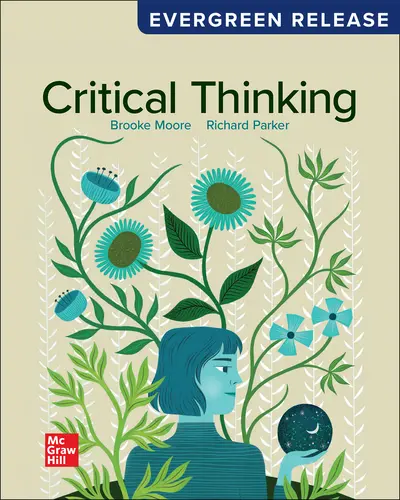My Account Details

ISBN10: 1266555730 | ISBN13: 9781266555732

Critical Thinking
Product not yet available for student view. Change to an older release to view student options.
- Lowest Price!
McGraw Hill eBook
Textbook Rental (150 Days Access)
- Rent for a fraction of the printed textbook price
- Complete text bound in hardcover or softcover
Loose-Leaf Purchase
Unbound loose-leaf version of full text
Shipping Options
- Standard
- Next-day air
- 2nd-day air
Orders within the United States are shipped via FedEx or UPS Ground. For shipments to locations outside of the U.S., only standard shipping is available. All shipping options assume the product is available and that processing an order takes 24 to 48 hours prior to shipping.
Note: Connect can only be used if assigned by your instructor.
Connect (180 Days Access)
- Digital access to a comprehensive online learning platform
- Includes homework, study tools, eBook, and adaptive assignments
- Download the free ReadAnywhere app to access the eBook offline
Connect + Loose-Leaf
- Comprehensive online learning platform + unbound loose-leaf print text package
- Connect includes homework, study tools, eBook, and adaptive assignments
- Download the free ReadAnywhere app to access the eBook offline
Shipping Options
- Standard
- Next-day air
- 2nd-day air
Orders within the United States are shipped via FedEx or UPS Ground. For shipments to locations outside of the U.S., only standard shipping is available. All shipping options assume the product is available and that processing an order takes 24 to 48 hours prior to shipping.
McGraw Hill eBook
Details:
- Normally the lowest price option for student
- Integrates in your LMS
- Accessible tools for students, including read-aloud functionality, jump links and dynamic note-taking and highlighting features
Textbook Rental (150 Days Access)
Details:
- Rentable option
- Hardcopy and softcover formats
Loose-Leaf Purchase
Details:
- Unbound loose-leaf version of full text
Connect (180 Days Access)
Details:
- Integrates in your LMS
- Prebuilt courses, presentation slides and instructor resources
- Test question banks, adaptive assignments, essay prompts, video content and more interactive exercises specific to your course subject
- eBook access (with included ReadAnywhere app)
- Print book add-on availability
- Remote proctoring
Connect + Loose-Leaf
Details:
- Comprehensive online learning platform + unbound loose-leaf print text package
- Connect includes homework, study tools, eBook, and adaptive assignments
- Download the free ReadAnywhere app to access the eBook offline
* The estimated amount of time this product will be on the market is based on a number of factors, including faculty input to instructional design and the prior revision cycle and updates to academic research-which typically results in a revision cycle ranging from every two to four years for this product. Pricing subject to change at any time.
Moore and Parker's Critical Thinking is not about critical thinking as much as it is a text in critical thinking. It provides guided practice through hundreds of exercises and examples, to help students apply content and think critically themselves. With an enjoyable, concise reading style and a visually clear layout, Critical Thinking trains students to improve information acquisition skills, recognize dubious claims, and hone critically important skills.
The authors' expanded coverage on how to recognize dubious claims is gravely applicable in the current climate of fake news, deep fakes, and AI-created information. The authors provide guided practice in what instructors say are the most important critical thinking skill sets for students.
1. Driving Blindfolded
2. Reasoning and Arguments
3. Vagueness, Generality, Ambiguity, and Definition
4. Believability of Claims and Credibility of Sources
5. Linguistic Persuasion Devices
6. Bogus Logos Part I: Relevance Fallacies
7. Bogus Logos Part II: Induction Fallacies
8. Bogus Logos III: Formal Fallacies, Fallacies of Ambiguity, and Fallacies Involving Miscalculating Probabilities
9. Deductive Arguments I (Natural Deduction): Categorical Logic
10. Deductive Arguments II: Truth-Functional (Sentential) Logic
11. Inductive Reasoning
12. Moral, Legal, and Aesthetic Reasoning
About the Author
Brooke Noel Moore
Brooke Moore is a professor of philosophy at California State University, Chico, where he serves as Coordinator of the Critical Thinking Program. A former chair of the Philosophy and History departments, Moore was the University Outstanding Professor in 1996. He has served as a university Master Teacher and has coordinated the university’s program for mentoring new faculty. His publications include The Power of Ideas (with Kenneth Bruder), The Cosmos, God, and Philosophy (with Ralph J. Moore), A Comprehensive Introduction to Moral Philosophy (with Robert Stewart), and other works.
Richard Parker
Richard Parker is Professor Emeritus of philosophy at California State University, Chico. He has been three times chair of the university's Faculty Senate, Dean of Undergraduate Education, and Executive Assistant to the President and has received Professional Achievement Honors for his academic work. He has published in analytic philosophy, critical thinking, and philosophy of law, and his views on punishment and responsibility have been included in major anthologies. Outside academia, Parker is a semiprofessional flamenco guitarist, performing with dancers around and about northern California; he rides a Harley-Davidson motorcycle, plays golf for fun and pool for money, and spends as much time as possible in southern Spain.
Need support? We're here to help - Get real-world support and resources every step of the way.